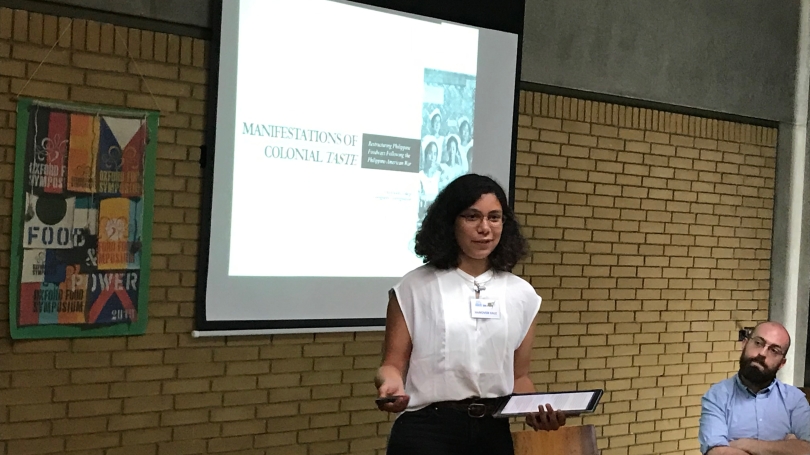
- Public Policy
- Leadership
- Funding
- News & Events
- About the Center
Back to Top Nav
Back to Top Nav
Back to Top Nav
Back to Top Nav
This summer, thanks to the support of the Rockefeller Center at Dartmouth, I was able to attend and present my paper at the 2019 Oxford Symposium on Food and Cookery ‘Food and Power’. While I expected to learn so much at this conference about the role of food in history, our lives, cultures, and relationships to land, I learned so much about what the discipline looks like and myself too. As it was my first conference, I was overwhelmed in wanting to attend all of the sessions that ran concurrently – and spent ample time researching the presenters, reading their papers, and preparing questions to try and focus my time and energy in the places that most interested me.
The theme of the session I presented in was named “Change and Continuity” and learned much from my co-presenter’s topics. Thinking about food, colonialism, and discourses of civilization was a thread in this session but throughout the conference as well. I learned a great deal about the relationships formed and power food wielded in the Australian colonial contact zone, thanks to Frieda Moran of the University of Tasmania, a presenter in my session. Her research and my own had so much methodological overlap and alignment, and that was such a new experience for me! I loved being able to talk with an established scholar about research.
Along these lines, a scholar from the University of Toronto, Nicholas Tosaj, presented on his work on wheat, bread, and colonialism in the French empire which I also found informing my own understanding of my research and, in general, my knowledge of what a compelling presentation is and looks like. Furthermore, as someone who is interested in critical race studies, the role of food as a lens to illuminate how race is constructed in different contexts was made apparent in Siobhan Dooley’s, a scholar at St. Andrews, presentation in which she examined food, drink, and race and identity in empire adventure stories.
Lastly, a lecture called “Lessons from a Small Island for a Small Planet” delivered by Zita Cobb, a social entrepreneur and individual in hospitality, shared how she understands the role of community, hospitality, food, and locality in creating local social enterprise. I was astonished by the intentionality behind the Fogo Island Inn, and the complex and positive relationships to land that this project facilitated, including restoring foodways to the area that had been previously eroded, and improving fish stocks in areas that had previously been overfished.
As a food studies conference, an emphasis is placed on consuming food and drink in a social and intellectual manner. At these lunch and dinner sessions, you could never imagine the folks you’d be interacting with and sitting next to. I’m grateful for the opportunity to connect almost naturally and accidentally with the recipients of the Young Chef’s award, two incredible young women Yolanda Wu and Monica Bettson with incredible careers in the culinary industry. Their work was so inspiring and it was fun to connect with people who had similar experiences in the restaurant industry as myself. I met artists who work in sugar sculpture, farmers, food writers, and young scholars as well.
As someone who is interested in pursuing a PhD in Food Studies after Dartmouth, this was an ideal conference and opportunity to think through if such a pursuit would be the right one for me. Reflecting on the experience of lecturing and contributing to knowledge, I am happy to feel more certain that it is.
-Submitted by Han Vale '20, Rockefeller Center Mini Grant Recipient
The Rockefeller Center's Mini-Grants program funds registration fees for students attending conferences, as well as the costs of bringing guest speakers to Dartmouth. The views and opinions expressed here are the author’s own and do not necessarily represent the views and opinions of the Rockefeller Center or constitute an endorsement by the Center.